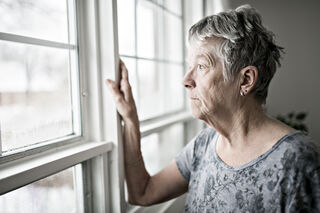Loneliness
What If Covid Infection Made You Terribly Lonely?
A infection leaves you feeling desperately alone no matter what.
Posted October 13, 2022 Reviewed by Abigail Fagan
Key points
- How would we react if a virus made us very lonely?
- The answer to this tells us about our social crisis of loneliness.
- Ultimately we must change how we live and what we consider of value.

What if the main effect of the Covid virus was to make you feel extremely lonely? We know that many people who had Covid and those trying to avoid it became lonely as a result.
My question is different. What if the direct effect of the Covid virus caused you to feel weary, bleak, wall-climbing loneliness? Once you caught the virus a deep sensation of isolation, abandonment, and hoping against hope that the phone would ring would quickly follow.
In everyday life loneliness can strike anyone. But most people have enough friends and family around to form a barrier, leaving the loneliness—and the lonely—outside the gates of their social fortress. But all a virus needs is a puff of air to penetrate the strongest defenses. You could at any time become infected with Covid and the gnawing solitude that would follow.
My intention in attaching a virus to the specter of loneliness is to make loneliness more democratic. To spread it around more evenly and observe what follows. Might loneliness become a cause celebré? Would being lonely take on a new cache as a real disease deserving of potluck dinners and 5K races? Would it soon be the object of intense scientific study planting the seeds of start-ups that would bet the house on a new drug?
Or would the leper be reborn, the impure reaping what they sowed? Would large groups of people be deemed infected, dirty, and avoidable at all costs?
The answers to these questions will point us either towards disgust of those infected or an acceptance of a risk we all share. In the latter case loneliness would not just be for the elderly, sick, and the square pegs. We’d all be in the same boat.
The case for disgust, however, is a worrisome likelihood. It raises the shadow of our evolutionary preoccupation with what appears unclean or contagious and its association with good and evil. This of course made sense to our distant ancestors as foul-smelling food was likely spoiled and thus harmful. It is no coincidence that most of medicine before the 20th century involved cleansing or releasing impurities. The result is words like “pure” and “impure”, “spoiled” and “wholesome” extend their scope of harm from food to human character.
The Outcome
In the beginning of our hypothetical Covid-loneliness pandemic many would believe lonely people just weren’t careful enough. This always happens with widespread bad luck. They must have brought it on themselves. Either this or those not infected were stronger, tougher. They worked hard and as a result were hardened against petty illness.
But as it spread these explanations would wear thin. Some of “us” would be getting infected and lonely. Tearfully, hopelessly lonely. We’d begin to fear the virus.
Fortunately, treatments would come along. But they’d only work for loneliness from Covid. The plain old lonely would stay back, unlucky as ever.
Loneliness is not just being solitary, nor is it simply alleviated by company. It is an interior state. The state of not belonging; not being among your people in everyday life. “Your people” is a big category, but not hard to recognize. These folks are connected to you (partner, mail carrier, coworker, cousin, neighbor), interested in some way (worried, curious) and present. This is all built in and invisible in ordinary life.
When something is built-in, it is very hard to imagine being without it. Perhaps this is protective in some way as loneliness has been shown to be quite toxic for our physical and mental health.
Our Current Crisis
In modern society loneliness has reached crisis proportions. The United Kingdom has even established a Minister of Loneliness to address the problem. It is all around us. Yet people are not knocking on doors inviting neighbors over for coffee. Rather, they hunker down with their computers. Why?
It is a well-known principle in psychiatry that to treat anxiety you must find what the patient avoids. We can reverse this for our current discussion: if we find what we avoid, anxiety lies beneath. This is why I proposed the thought experiment of Covid-caused-loneliness. By making loneliness contagious it becomes a more obvious threat. How we deal with the threat opens the door to our preconceptions, biases, and deepest fears.
I propose that the way we live answers the question of disgust versus acceptance. No society but ours are sends the elderly away to live out their lives hoping for a family visit while watching endless TV. Nor do other societies send short text messages to their struggling friends and relatives—“You got this!”—alleviating the small investment needed to write the briefest of notes. Many criticize social media for much of our social plight. This certainly has been part of the problem, but now people flock to social media precisely because they are lonely.
Oddly, many believe they are intruding if they do more than send a text message. This suggests that community and companionship are not currently valued high enough to merit the knock on the door. This is privacy twisted by forces of individualism to become the absurd thing we now live with.
The Great Transformation
There are many unavoidable, painful things in life. Loneliness need not be one. Not in life. Not in death. Not in grief, birth, raising a family, work, distraction, or fun. Yes, we are alone in many things by necessity. But that is the point of being in someone’s life. You are part of the story of what happens to them, even when they are alone.
We need to reconstruct our lives around the inclusion of others. Not virtually or by meta rooms. This does mean adopting new life habits, and as with many important life changes it means some letting go. In this case letting go of some of our modern preoccupations. Work; unneeded, redundant material things; and prestige are high on this list. Any action must be personal. Once again, the knock on the door is where it begins.
No one knows where social and cultural changes begin. With one person or many who feel the pressure of needed change. We are seeing the possibility of transformation as people are leaving their jobs in the “great resignation.” They are leaving for quality of life; specifically, more time away from work and the stress it brings. Will this translate into a sense of belonging for them and those around them? Time will tell.
The threshold we need to cross is where a preference becomes a value. But most people are stuck. It’s difficult to learn new values before they become part of your culture, a part of daily life in the world around you. Who will be the teachers in this next great transformation?




